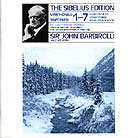July 2000
Apart from one budget-label disc only available in the UK and a Chesky issue of his Second, I don't believe that any of Sir John's studio recordings of the Sibelius symphonies have previously been available on CD outside Japan. (However, there was a blistering live Fifth on the defunct BBC Classics label). This should be and will be a complete mystery to anyone who hears this generously filled set. Barbirolli was one of the few conductors who could get inside every single one of Sibelius's very different symphonies and convey each of their special qualities. The near-Tchaikovskian First, for instance, brings out the Romantic in Barbirolli, who plays the symphony for all it's worth -- in my opinion the only way; any hint of apology for the work's youthful naiveté is fatal. And what a wealth of detail he reveals! The coda to the finale, for example; while it is so often the case that the harp and lower strings seem to be present merely to add atmosphere, without their notes themselves being clear, here and in many other places throughout this set, Barbirolli's sense of and control over detail is simply extraordinary. The Second Symphony's overtly nationalistic fervor also brings out the best in Barbirolli. Indeed, as he recorded the Second six times, I suspect he had a special regard for the work. This, his last recording, is as fine as any, although I confess to a sneaking preference for his own 1940 NYPO recording, which has a unique intensity. Perhaps the Third is the least successful performance of the set; Barbirolli's tempos are on the slow side, although they never drag and there is some marvelously affectionate playing. Although a very fine performance, this is still probably the only one of the seven in which I think Barbirolli can be bettered: Collins (Beulah) and Davis (Phillips, rather than his RCA remake) spring immediately to mind. The bleak despair of the Fourth again finds Barbirolli at peak form; the grinding discords in the opening movement are quite terrifying, and I don't recall another performance in which those final three bare A's sound so final. Barbirolli almost seems to drag the sounds out of his players. I was expecting great things of Barbirolli's Fifth and wasn't disappointed. The live performance previously available may outclass in sheer intensity, but not by much and the studio performance has the advantage of greater accuracy. This is one of the great Fifths. Sibelius's Sixth is an enigmatic work, "pure rainwater" to quote the composer, as opposed to the "cocktails" of others. This was one of Barbirolli's last recordings, made less than two months before his death in June 1970. There is no sign of any lessening of his powers (although by this time he was a very sick man indeed); another wonderful performance. The conventional wisdom has it that Koussevitsky's pioneering 1933 BBC SO recording of the Seventh (Pearl) has never been bettered. I beg to differ. Barbirolli's is every bit as incandescent and, of course, far better recorded. Once again he manages to convey an utter finality in the closing cadence, which so often sounds unfinished in lesser hands. My only regrets about the marvelous selection of shorter works included (almost two CDs worth) is that there is no Tapiola (I'm not aware that Barbirolli ever recorded it). The Hallé have had their share of bad press over the years, but by the time of the earliest of these recordings, Barbirolli had been at their helm for over two decades and had rebuilt the orchestra from the shattered wreck he took over in 1943. Their love of him and his love of both them and the music is evident in every bar. There is some fabulously incisive playing and also some superbly rich sounds that would not disgrace Berlin or Vienna. All of this is in vintage 1960s sound, reprocessed using the Prism SNS noise-shaping system and coming up fresh as paint. Only an occasional hint of edginess to the upper registers of the strings betrays the age of the recordings. In summary, this is possibly the finest complete cycle of the Sibelius Symphonies I've heard. With the possible exception of the Third, they rank with the best ever made. Generously coupled and at mid-price. GO BACK TO: |
 Sibelius -
Symphonies Nos. 1-7, Miscellaneous
Orchestral Works
Sibelius -
Symphonies Nos. 1-7, Miscellaneous
Orchestral Works ![[Reviewed on CD]](../format/regcd.gif) Sir
John Barbirolli was a central figure in my own musical education in England in the 1960s.
His recordings were widely available, and I heard him conduct in person a number of times.
Barbirolli's reputation as both champion and supreme interpreter of English music has
always been secure; a gradual process of CD reissues is revealing that he was so much more
than that.
Sir
John Barbirolli was a central figure in my own musical education in England in the 1960s.
His recordings were widely available, and I heard him conduct in person a number of times.
Barbirolli's reputation as both champion and supreme interpreter of English music has
always been secure; a gradual process of CD reissues is revealing that he was so much more
than that.